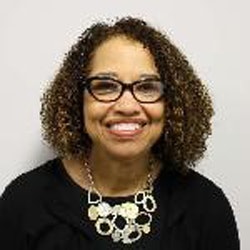They have been around forever, supporting women of color in common and unique ways. Sister circles that nourish the needs of Black women have a firm history in the Black community. Organizations such as Black sororities, sewing guilds, health groups, church societies, and book clubs were established out of the need for Black women to come together to support one another. These sister circles have provided strength, purpose, and love where there may have been none.
 Patricia Carver
Patricia CarverBlack women have their own special place in the United States, attempting to figure out where they fit in, due to the intersection of gender, race, and class. The intersection of these identities can sometimes be overwhelming and downright difficult to maneuver. As a Black woman progressing through a Ph.D. program in higher education, I believe it would be nearly impossible without my sister circle.
Organic groups of sister circles, such as the one at Indiana University, are forming across the country on many college campuses. Eight African-American women from Indiana University earned their Ph.D.s in education. It was reported that this number was quite high, even for a program that usually has a great number of African-American doctoral candidates. They attributed much of their success to the sister circle that they formed to support one another through their educational journey.
Even though these groups are usually not formally recognized, they are integral to the success of Black women Ph.D. candidates. At the university where I attend, there are three Black women in my program. We have formed our own sister circle which has been invaluable to the pursuit of our degrees.
We have vowed to support each other to the end. We have laughed, cried, studied, cajoled, and threatened one another—all in the name of sisterhood. We commit to one another that we will not fail in this process. It is our torch to carry to show our daughters, granddaughters, sisters, nieces, and friends that they can do it too. They will have our shoulders to stand on that we willingly offer.
My sisters and I were all born in different decades, live life differently, and have diverse goals; however, the bonds of the Ph.D. journey and sisterhood have held us together.
I am in my 60s and will continue in the classroom, teaching in the business school. Another sister, a recent new mom who commutes from another state, has aspirations of one day taking on a leadership role at a college or university. The other sister, who recently moved from higher education into private industry, is all about exploring the possibilities. We are in our third year of the process and will begin our dissertation writing very soon. It is a stressful but exciting time for us. What is most important is that I know that we will not only survive the process, but we will soar.
What concerns me more are the three or four women of color who were in the program and did not have the advantage of a circle of sisters. They have dropped out or are lagging behind in their coursework. Many of these women were part of a different doctoral program and did not form a close connection with one another or attempt to join our circle of sisters. I feel as if I have failed them for not inviting them into our circle. In the hurried, stressful life of a Ph.D. program, I neglected to consider their needs. I should have made the simple gesture of offering a phone number or an invite to lunch. It would have been the honorable, right, and just thing to do.
Another part of me feels as if the school could have done more as well. We are all in a higher education program that is supposed to focus on the affairs of the student. Why is it that we have to form our special circle?
The school could have helped us with connecting to one another. The connection could be something as simple as sponsoring lunch or coffee; just something, to bring students together so that we are aware of who is in the program seeking support.
The school should see the importance of assisting the needs of Black women who only make up approximately 5 percent of all Ph.D. recipients in the United States according to Black Woman PhD’s website. This website also reported that overall, Ph.D.s are less than 2 percent of the total U.S. population. Where is the foresight of the student affairs department that is supposed to be about the success and development of the students?
Support groups for women of color can make the difference between the success and failure of a student. Having my small circle of sisters has become a central and integral part of my Ph.D. program. It is essential, necessary, and sacred.
Patricia Carver is an Instructor in the Rubel School at Bellarmine University in Louisville, Ky. She is currently pursuing a doctorate in Leadership in Higher Education from Bellarmine University.





















